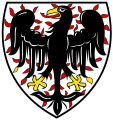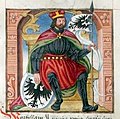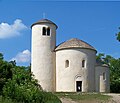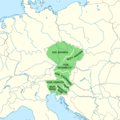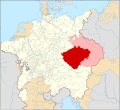Welcome to the Czech Portal!
Vítejte na Českém portálu!

|

|

| |
The Czech Republic, also known as Czechia, and historically known as Bohemia, is a landlocked country in Central Europe. The country is bordered by Austria to the south, Germany to the west, Poland to the northeast, and Slovakia to the southeast. The Czech Republic has a hilly landscape that covers an area of 78,871 square kilometers (30,452 sq mi) with a mostly temperate continental and oceanic climate. The capital and largest city is Prague; other major cities and urban areas include Brno, Ostrava, Plzeň and Liberec.
The Duchy of Bohemia was founded in the late 9th century under Great Moravia. It was formally recognized as an Imperial Estate of the Holy Roman Empire in 1002 and became a kingdom in 1198. Following the Battle of Mohács in 1526, all of the Lands of the Bohemian Crown were gradually integrated into the Habsburg monarchy. Nearly a hundred years later, the Protestant Bohemian Revolt led to the Thirty Years' War. After the Battle of White Mountain, the Habsburgs consolidated their rule. With the dissolution of the Holy Roman Empire in 1806, the Crown lands became part of the Austrian Empire.
In the 19th century, the Czech lands became more industrialized; further, in 1918, most of the country became part of the First Czechoslovak Republic following the collapse of Austria-Hungary after World War I. Czechoslovakia was the only country in Central and Eastern Europe to remain a parliamentary democracy during the entirety of the interwar period. After the Munich Agreement in 1938, Nazi Germany systematically took control over the Czech lands. Czechoslovakia was restored in 1945 and three years later became an Eastern Bloc communist state following a coup d'état in 1948. Attempts to liberalize the government and economy were suppressed by a Soviet-led invasion of the country during the Prague Spring in 1968. In November 1989, the Velvet Revolution ended communist rule in the country and restored democracy. On 31 December 1992, Czechoslovakia was peacefully dissolved, with its constituent states becoming the independent states of the Czech Republic and Slovakia.
The Czech Republic is a unitary parliamentary republic and developed country with an advanced, high-income social market economy. It is a welfare state with a European social model, universal health care and free-tuition university education. It ranks 32nd in the Human Development Index. The Czech Republic is a member of the United Nations, NATO, the European Union, the OECD, the OSCE, the Council of Europe and the Visegrád Group. (Full article...)
Selected article -
The Bartered Bride (Czech: Prodaná nevěsta, The Sold Bride) is a comic opera in three acts by the Czech composer Bedřich Smetana, to a libretto by Karel Sabina. The work is generally regarded as a major contribution towards the development of Czech music. It was composed during the period 1863 to 1866, and first performed at the Provisional Theatre, Prague, on 30 May 1866 in a two-act format with spoken dialogue. Set in a country village and with realistic characters, it tells the story of how, after a late surprise revelation, true love prevails over the combined efforts of ambitious parents and a scheming marriage broker.
The opera was not immediately successful, and was revised and extended in the following four years. In its final version, premiered in 1870, it rapidly gained popularity and eventually became a worldwide success. Until this time, the Czech national opera had only been represented by minor, rarely performed works. This opera, Smetana's second, was part of his quest to create a truly Czech operatic genre. Smetana's musical treatment made considerable use of traditional Bohemian dance forms, such as the polka and furiant, and, although he largely avoided the direct quotation of folksong, he nevertheless created music considered by Czechs to be quintessentially Czech in spirit. The overture, often played as a concert piece independently from the opera, was, unusually, composed before almost any of the other music had been written. (Full article...)
Selected picture

Photographer: Jerzy Strzelecki; License: Dual (GNU Free Documentation License and Creative Commons CC-BY-SA)
In this month
- 14 November 1960 – The deadliest rail disaster in Czech history takes place in Eastern Bohemia, resulting in 118 deaths
- 14 November 1918 – Tomáš Garrigue Masaryk (pictured) becomes the first President of Czechoslovakia
- 17 November 1939 – Nazi Germany storms Czech universities, executing nine students and professors, later commemorated as International Students' Day
- 17 November 1989 – The Velvet Revolution starts in Prague, culminating in the end of 41 years of Communist rule in Czechoslovakia
- 24 November 1966 – The deadliest air disaster in Czechoslovakia takes place near Bratislava, killing all 82 on board
Categories
Selected biography -
Vojtěch Jarník (Czech pronunciation: [ˈvojcɛx ˈjarɲiːk]; 22 December 1897 – 22 September 1970) was a Czech mathematician. He worked for many years as a professor and administrator at Charles University, and helped found the Czechoslovak Academy of Sciences. He is the namesake of Jarník's algorithm for minimum spanning trees.
Jarník worked in number theory, mathematical analysis, and graph algorithms. He has been called "probably the first Czechoslovak mathematician whose scientific works received wide and lasting international response". As well as developing Jarník's algorithm, he found tight bounds on the number of lattice points on convex curves, studied the relationship between the Hausdorff dimension of sets of real numbers and how well they can be approximated by rational numbers, and investigated the properties of nowhere-differentiable functions. (Full article...)
Did you know?

- ...that, although Mozart never visited Kroměříž, much of the Academy Award-winning film Amadeus was filmed at the local episcopal residence?
- ... that the leftist Czechoslovak Chemical Workers' Union was expelled from the OSČ trade union centre in 1922?
- ... that footballer Petr Vrabec won six Czechoslovak league titles with Sparta Prague?
- ... that Josef Jiří Kolár was the first to begin a systematic translation of Shakespeare's plays into Czech?
General images
Related portals
Topics

Czech lands: Bohemia • Moravia • Czech Silesia
History: Únětice culture • Boii • Marcomanni • Samo • Great Moravia • Přemyslid dynasty • Lands of the Bohemian Crown • Czech lands (1526–1648) • 1648–1867 • 1867–1918) • Czechoslovakia • Czech Republic
Geography: Lakes • Protected areas • Regions • Rivers
Law: Judiciary • Law enforcement • Supreme Court of the Czech Republic
Politics: Administrative divisions • Government • Constitution • Elections • Foreign relations • Army • Parliament • Political parties • President • Prime Minister
Economy: Banks • Czech koruna • Energy • Oil and gas deposits • Stock Exchange • Tourism • Transport
Culture: Architecture • Art • Cinema • Cuisine • Demographics • Education • Language • Literature • Media • Music • Philosophy • Prostitution • Public holidays • Religion • Sport • Television • Video games
Symbols: Flag • Coat of arms • National anthem (Kde domov můj)
Lists: Outline of the Czech Republic • List of Czech Republic–related topics
WikiProjects
Featured and good content
Things to do
Wikimedia
The following Wikimedia Foundation sister projects provide more on this subject:
-
Commons
Free media repository -
Wikibooks
Free textbooks and manuals -
Wikidata
Free knowledge base -
Wikinews
Free-content news -
Wikiquote
Collection of quotations -
Wikisource
Free-content library -
Wikiversity
Free learning tools -
Wikivoyage
Free travel guide -
Wiktionary
Dictionary and thesaurus






























